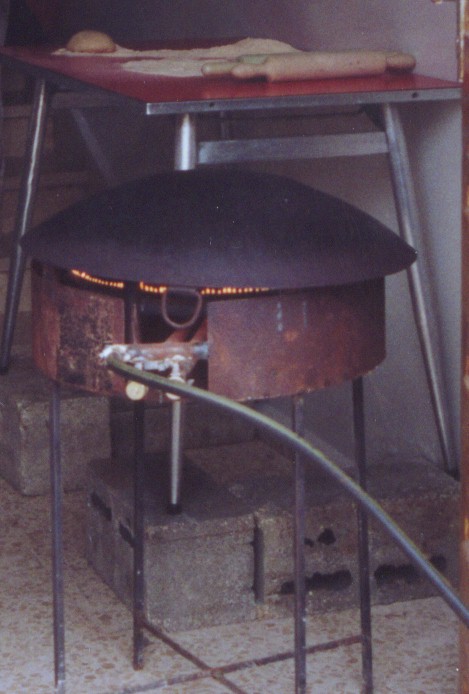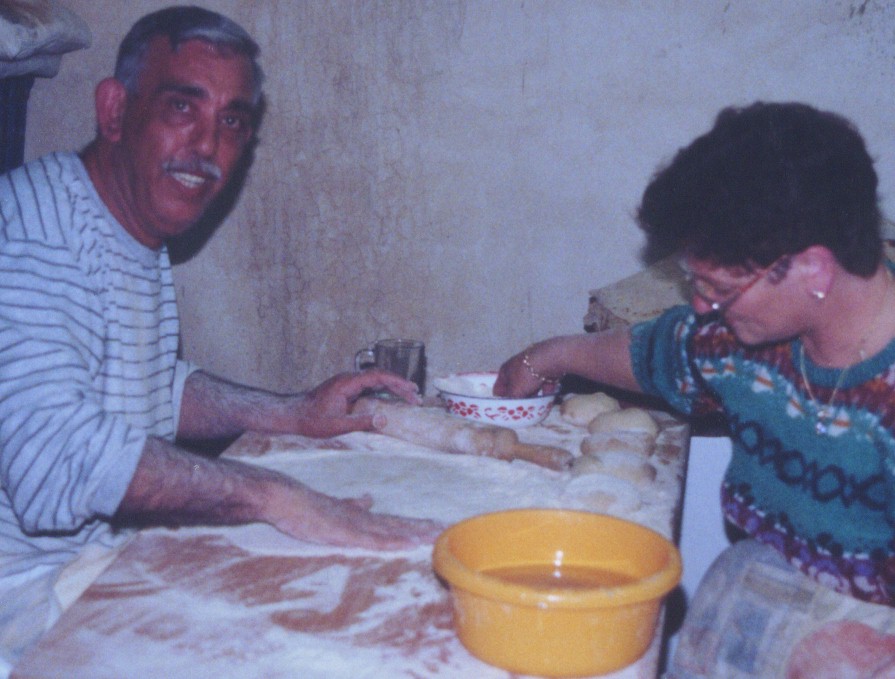
|
In this Issue *The beginning of Passover Starts with Prayers
*The Matzos of the Feast of Unleavened Bread *The Weeks of the Counting of the 'Omer *The Pressure Between the Samaritans and Their Neighbors in Neot
Yehudith Holon Neighborhood is Rising. *Samaritan Torah Fragments Written on Parchment. Link To the Samaritan Calendar
To The Samaritan Update Index or to our Web Site, The Samaritans.com on the Web Photos of The Samaritans Maintaining The Ritual of Sacrificing the Passover in 1934 Samaritan Torah
Fragments Written on Parchment; from Palestine of the 15th century is
for sale. 4 leaves
comprising 8 pages, archivally bound, collection of David Solomon Sassoon, with
his colophon on 1st and 4th pages. Rare!! More details upon request. Item Coming soon! The Messianic Hope of the Samaritans By Jacob, Son of Aaron, High Priest of the Samaritans, 1907 AND
Literary
Remains of the Late Emanuel Deutsch
With
a Brief Memoir, 1874 AND
The
Return of the Diaspora Samaritans to Nablus at the End of the Middle Ages
By
Nathan Schur Samaritans, Smallest
Minority in Holy Land, Straddle Religious Divide By Daniel Williams Washington Post Foreign Service Monday, April 9, 2001; Page A13 The Division Between Days The Evenings with
us number three: first, the going down of the sun in a westerly direction;
second, the immersion of the disk of the sun into the sea; and, third, the disappearance
of the redness of the western skies from the sun. From Dan to Beersheba by J. P. Newman Chapter X http://www.dabar.org/Newman/Ch10.htm Get a free E-mail Address from www.The-Samaritans.com/ . Just go to our web site and find “get a free e-mail address” or go to http://samaritan.i-p.com/ and register. Let people know you are involved with the Samaritans. Would like to Thank the
Authors of the Articles on Our Website! Thank You !!!!! Subscribe to the A.B.- The
Samaritan News- Since December 1969. A Bi-Weekly Newspaper, Written in Four Languages. POB 1029, Holon 58 110, Israel or E-mail Benyamim
and Yefet Tsedaka at:
tsedakab@netvision.net.il Back Issues Are Available. For Sale From the Store of The-Samaritans.Com: The CD of the Samaritan Singers, A copy of the Samaritan Torah, Post cards of the Samaritans Or if you are looking for something different. Interested parties can contact us at webmaster@The-Samaritans.com |
The Passover Sacrifice Will Take Place Tomorrow Afternoon, Friday, April 26th .
The Beginning of the Passover Starts with Prayers. Because of the commandment that
no work be permitted on the Sabbath, the sacrifice will take place in the
afternoon before the Sabbath this year. Therefore, the sacrifice will occur
in the afternoon, on Friday. The Samaritans will all dress in white
clothes, “so that no one stands out over the next person”. Only the High
Priests and Elders are allowed to wear different colored garments,
traditional garments of course. The families help the older Elders to their
chairs before the festivities begin. The men each have a cane or a type of
staff along with wearing their sandals . ‘The Celebration of Passover by the Samaritans’
Ya’aqov Ben Uzzi Ha-Cohen
PART 1 of The Book of Enlightenment For the Instruction of the Inquirer /Jacob,Son of Aaron, (Concerning the origin and significance of the ceremonial year, the time of the institution of the Passover and the Passover when the date falls on the Sabbath.) The Days of Passover with the Samaritans on Mount Gerizim/Larry Rynearson
The Prophecy of The End Of the
Of Days By The Prophets Of Judah Is Realized
Every Passover At Kiryat Luza/Benjamim Tsedaka
Or visit your Library and Read: National Geographic Magazine, Jan. 1920 or The Samaritans by Reinhard Pummer or read The Samaritans, Edited by Alan Crown The Matzos of the Feast of Unleavened Bread On the day before the
Passover, the 13th day of the Samaritan Biblical year matzos
(unleavened bread) is baked. The day prior, all leaven was cleaned from the
houses. Beginning the ancient memorial of baking the Matzos. The dough
is rolled into fist-sized balls. The ov The Weeks of the Counting of the 'Omer The counting of the 'omer starts on the first Sunday after the Passover Sacrifice making it the 28th of this month. Then as stated in Leviticus 23:15 of the Samaritan Torah, "And ye shall count unto you from the marrow after the Sabbath, from the day that ye brought the sheaf of the wave offering; seven Sabbaths shall be complete." From the first day of the 'omer, seven weeks are counted and the festival of Pentecost will be celebrated on Sunday of the eighth week. The names of the weeks as given in the KS are the following. 1. "Week of the crossing of the (Red) Sea" (Exodus 14:26-15:21) 2. "Week of the changing of the water of marah" (Exodus 15:22-26) 3. "Week of elim, where they found twelve water springs and seventy palm trees" (Exodus 15:27-16.3 4."Week of the man, which fell down upon them from heavens in the desert" (Exodus 16.4-36) 5. "Week of the welling out of water from the rock" (Exodus 17.1-7) 6. "Week of the battles against 'Amaleq" (Exodus 17.8-17) 7. "Week of standing at Mt. Sinai" (Exodus 19.1 ff.) (From the writing of Sylvia Powels from the book, "The Samaritans, edited by Alan Crown. Wonderful works. Buy it and read it today.) The Pressure Between the Samaritans and Their Neighbors in Neot
Yehudith Holon Neighborhood is Rising. The conspicuous difference between the traditional life style of the Samaritans and their secular neighbors from the Neot Yehudith neighborhood yielding negative effects and is overshadowing their relations. Some of the Samaritan families at the Neot Yehudith neighborhood are suffering from their neighborhood are suffering from their neighbors’ social pressure. The Samaritan families settled in Maalot Street in Neot Yehudith neighborhood, which is adjacent to the Samaritan quarter, mostly as they had no other choice. Housing expansion plans for the neighborhood have now been stuck for nearly two decades between the Holon Municipality and the Israel land Authority. All the effects to get the plans into momentum were of no avail. This inability to find housing in the Samaritan neighborhood forced more than 20 young Samaritan couples to look for housing in neighborhoods adjacent to the Samaritan quarter: Neot Yehudith and Neveh Arazim. Neveh Arazim is built of single houses whereas in Neot Yehudith the housing units are in condominiums, which increases the social friction between the groups. Conflicts between residents of Neot Yehudith and residents of the Samaritan neighborhood are not uncommon, particularly among those living on the bisecting line of the neighborhoods. Those are the obvious consequences of the distinct difference in the manner of traditional observances on the Sabbaths. However, the novelty of the situation is in the fact that this friction is no longer between two neighborhoods but is inside the neighborhood of Neot Yehudith itself, on the northern edge of Maalot Street. Residents from Neot Yehudith have begun complaining about the traditional vestures of the Samaritans on Saturdays. Samaritans perform the reading of the weekly portion in small groups inside the houses, to enable each prayer to take place in the reading. Reading is done by singing out loud, which disturbs the Sabbath rest of their neighbors who retire to their beds to sleep on Saturdays after having played cards and partied even into the hours when their Samaritan neighbors get up for their morning prayers. According to one of their neighbors the custom of playing cards and organizing parties on Friday nights into the small hours is customary everywhere in Israel. “And not as these Samaritans with their red turbans and white garments do”- so she speaks for many of the Samaritan neighbors. “You, the Samaritans, should adapt yourselves to our life style and not interrupt our Sabbath rest with your prayers and your loud conversations after prayers!” There’s also the phenomenon of voicing derisive remarks on Samaritan customs. Copies of a film about the Passover Sacrifice of the Samaritans were distributed not long ago among the residents by one of the neighbors of the Samaritans, which only increased the ridicule. Should this negative activity continue the Samaritans will react severely to racial expressions and as in the past, dissatisfied Jewish neighbors will move to live in another place. (A.B. Services) |
|
Thank you! |

 en is a 28-inch or so steel shaped
bowl resting upside down over a flame of wood or propane. The men or
ladies pound the dough flat and then flip it from arm to arm like pizza
dough. When the dough is thin and about 18-22-inches in diameter it is placed
on the steel pan to bake. After about 20 seconds, the bread is flipped over
for another 20 or so seconds more. Every now and then water is sprinkled over
the oven to clean the surface of any remnants than may have remained from the
bread. The unleavened bread of wheat and water does not take long to bake. It
is placed then on a stack for the weeks use. The bread is soft and most
enjoyable to eat. It is acceptable to sample the unleavened bread but only
until midnight. Then the bread must sit until the Feast begins. Also from
midnight on till the
seasonal festival is over, no prepared food is permitted by the Samaritans.
Only what is made from natural products are permitted excluding
en is a 28-inch or so steel shaped
bowl resting upside down over a flame of wood or propane. The men or
ladies pound the dough flat and then flip it from arm to arm like pizza
dough. When the dough is thin and about 18-22-inches in diameter it is placed
on the steel pan to bake. After about 20 seconds, the bread is flipped over
for another 20 or so seconds more. Every now and then water is sprinkled over
the oven to clean the surface of any remnants than may have remained from the
bread. The unleavened bread of wheat and water does not take long to bake. It
is placed then on a stack for the weeks use. The bread is soft and most
enjoyable to eat. It is acceptable to sample the unleavened bread but only
until midnight. Then the bread must sit until the Feast begins. Also from
midnight on till the
seasonal festival is over, no prepared food is permitted by the Samaritans.
Only what is made from natural products are permitted excluding  anything
leaven, of course. A treat for the children and even a few adults are
homemade sugar drops. With all the matzos made, it is time to visit the
family, neighbors and friends. Hot tea with sugar or fresh juice is the
general welcome.
anything
leaven, of course. A treat for the children and even a few adults are
homemade sugar drops. With all the matzos made, it is time to visit the
family, neighbors and friends. Hot tea with sugar or fresh juice is the
general welcome.